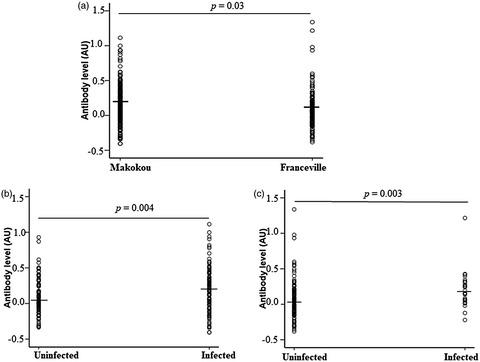当前位置:
X-MOL 学术
›
Clin. Exp. Immunol.
›
论文详情
Our official English website, www.x-mol.net, welcomes your feedback! (Note: you will need to create a separate account there.)
IgG antibody response against Plasmodium falciparum aminopeptidase 1 antigen in Gabonese children living in Makokou and Franceville.
Clinical & Experimental Immunology ( IF 4.6 ) Pub Date : 2020-02-21 , DOI: 10.1111/cei.13425 S L Oyegue-Liabagui 1 , R-K Imboumy-Limoukou 2 , C L Kouna 2 , F Bangueboussa 1, 2 , M Schmitt 3 , I Florent 4 , J B Lekana-Douki 2, 5
Clinical & Experimental Immunology ( IF 4.6 ) Pub Date : 2020-02-21 , DOI: 10.1111/cei.13425 S L Oyegue-Liabagui 1 , R-K Imboumy-Limoukou 2 , C L Kouna 2 , F Bangueboussa 1, 2 , M Schmitt 3 , I Florent 4 , J B Lekana-Douki 2, 5
Affiliation

|
The search for novel chemical classes of anti-malarial compounds to cope with the current state of chemoresistance of malaria parasites has led to the identification of Plasmodium falciparum aminopeptidase 1 (PfA-M1) as a new therapeutic target. PfA-M1, known to be involved in the hemoglobin digestion cascade which helps to provide most of the amino acids necessary to the parasite's metabolism, is currently considered as a promising target for anti-malarial chemotherapy. However, its immunogenic properties have not yet been tested in the Gabonese population. In Gabon, the prevalence of malaria remains three times higher in semi-urban areas (60·12%) than in urban areas (17·06%). We show that malaria-specific PfA-M1 antibodies are present in children and increase with the level of infection. Children living in semi-urban areas have higher anti-PfA-M1 antibody titers (0·14 ± 0·02 AU) than those living in urban areas (0·08 ± 0·02 AU, P = 0·03), and their antibody titers increase with age (P < 0·0001). Moreover, anti-PfA-M1 antibody titers decrease in children with hyperparasitemia (0·027 ± 0·055 AU) but they remain high in children with low parasite density (0·21 ± 0·034 AU, P = 0·034). In conclusion, our results suggest that malaria-specific PfA-M1 antibodies may play an important role in the immune response of the host against P. falciparum in Gabonese children. Further studies on the role of PfA-M1 during anemia are needed.
中文翻译:

生活在Makokou和Franceville的加蓬儿童中针对恶性疟原虫氨肽酶1抗原的IgG抗体反应。
寻找新的化学类别的抗疟疾化合物以应对疟原虫化学耐药性的现状已导致鉴定出恶性疟原虫氨基肽酶1(PfA-M1)作为新的治疗靶标。已知参与血红蛋白消化级联反应的PfA-M1可帮助提供寄生虫代谢所需的大多数氨基酸,目前被认为是抗疟疾化疗的有希望的靶标。但是,尚未在加蓬人口中测试其免疫原性。在加蓬,疟疾的流行率在半城市地区(60·12%)仍然是城市地区(17·06%)的三倍。我们表明,疟疾特异性的PfA-M1抗体存在于儿童中,并随着感染水平的增加而增加。生活在半城市地区的儿童的抗PfA-M1抗体滴度(0·14±0·02 AU)比城市地区的儿童(0·08±0·02 AU,P = 0·03)高,并且它们的抗体效价随年龄增长而增加(P <0·0001)。此外,高寄生虫血症儿童(0·027±0·055 AU)的抗PfA-M1抗体滴度降低,但寄生虫密度低的儿童(0·21±0·034 AU,P = 0·034)仍然较高。 。总之,我们的结果表明,疟疾特异性PfA-M1抗体可能在加蓬儿童的宿主对抗恶性疟原虫的免疫反应中起重要作用。需要进一步研究PfA-M1在贫血中的作用。高寄生虫血症儿童(0·027±0·055 AU)的抗PfA-M1抗体滴度降低,但寄生虫密度低的儿童(0·21±0·034 AU,P = 0·034)仍然较高。总之,我们的结果表明,疟疾特异性PfA-M1抗体可能在加蓬儿童的宿主对抗恶性疟原虫的免疫反应中起重要作用。需要进一步研究PfA-M1在贫血中的作用。高寄生虫血症儿童(0·027±0·055 AU)的抗PfA-M1抗体滴度降低,但寄生虫密度低的儿童(0·21±0·034 AU,P = 0·034)仍然较高。总之,我们的结果表明,疟疾特异性PfA-M1抗体可能在加蓬儿童的宿主对抗恶性疟原虫的免疫反应中起重要作用。需要进一步研究PfA-M1在贫血中的作用。
更新日期:2020-02-06
中文翻译:

生活在Makokou和Franceville的加蓬儿童中针对恶性疟原虫氨肽酶1抗原的IgG抗体反应。
寻找新的化学类别的抗疟疾化合物以应对疟原虫化学耐药性的现状已导致鉴定出恶性疟原虫氨基肽酶1(PfA-M1)作为新的治疗靶标。已知参与血红蛋白消化级联反应的PfA-M1可帮助提供寄生虫代谢所需的大多数氨基酸,目前被认为是抗疟疾化疗的有希望的靶标。但是,尚未在加蓬人口中测试其免疫原性。在加蓬,疟疾的流行率在半城市地区(60·12%)仍然是城市地区(17·06%)的三倍。我们表明,疟疾特异性的PfA-M1抗体存在于儿童中,并随着感染水平的增加而增加。生活在半城市地区的儿童的抗PfA-M1抗体滴度(0·14±0·02 AU)比城市地区的儿童(0·08±0·02 AU,P = 0·03)高,并且它们的抗体效价随年龄增长而增加(P <0·0001)。此外,高寄生虫血症儿童(0·027±0·055 AU)的抗PfA-M1抗体滴度降低,但寄生虫密度低的儿童(0·21±0·034 AU,P = 0·034)仍然较高。 。总之,我们的结果表明,疟疾特异性PfA-M1抗体可能在加蓬儿童的宿主对抗恶性疟原虫的免疫反应中起重要作用。需要进一步研究PfA-M1在贫血中的作用。高寄生虫血症儿童(0·027±0·055 AU)的抗PfA-M1抗体滴度降低,但寄生虫密度低的儿童(0·21±0·034 AU,P = 0·034)仍然较高。总之,我们的结果表明,疟疾特异性PfA-M1抗体可能在加蓬儿童的宿主对抗恶性疟原虫的免疫反应中起重要作用。需要进一步研究PfA-M1在贫血中的作用。高寄生虫血症儿童(0·027±0·055 AU)的抗PfA-M1抗体滴度降低,但寄生虫密度低的儿童(0·21±0·034 AU,P = 0·034)仍然较高。总之,我们的结果表明,疟疾特异性PfA-M1抗体可能在加蓬儿童的宿主对抗恶性疟原虫的免疫反应中起重要作用。需要进一步研究PfA-M1在贫血中的作用。


























 京公网安备 11010802027423号
京公网安备 11010802027423号